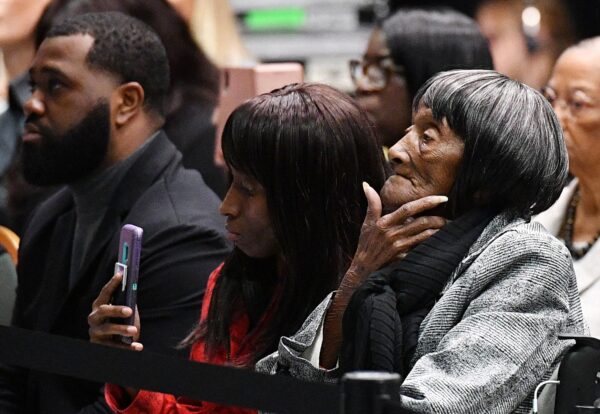‘They Were Clearly Wronged’: Philanthropists Donate $1M to Tulsa Massacre Survivors
The three remaining survivors of one of America’s largest racially motivated crimes against Black people are now hundreds of thousands of dollars richer.
A New York-based nonprofit has made a substantial donation to them to assist in making the last years of their lives “comfortable” and stress-free, in some sense a compensation for the harms inflicted on them over 100 years ago.
Tulsa race massacre survivor Lessie Benningfield Randle (R) listens as US President Joe Biden speaks during a commemoration of the 100th anniversary of the Tulsa Race Massacre at the Greenwood Cultural Center in Tulsa, Oklahoma on June 1, 2021. (Photo by MANDEL NGAN / AFP) (Photo by MANDEL NGAN/AFP via Getty Images)
On Wednesday, May 18, the Business for Good Foundation donated $1 million to the three survivors from the 1921 Tulsa Race Massacre, 108-year-old Viola Fletcher, 107-year-old Lessie Benningfield Randle, and 101-year-old Hughes Van Ellis.
The trio, who were children when the devastating riot occurred, were presented the check at the Greenwood Cultural Center, located in the heart of Tulsa and created to preserve African American history and heritage through programs and exhibitions.
Fletcher, the oldest of the three, was 7 years old when mobs attacked the all-Black community of Greenwood, a booming business district known as “Black Wall Street,” the Washington Post reports.
While there have been documentaries, movies, television shows, and books created about the massacre that killed at least 300 and displaced 10,000 Black people, not one white person was arrested or charged for the savagery.
The survivors recalled days after the incident, survivors were gathered at gunpoint and placed in “internment camps.”
Fletcher said, “I will never forget the violence of the white mob when we left our home.”
“I still see Black men being shot, Black bodies lying in the street,” she said. “I still smell smoke and see fire. I still see Black businesses being burned. I still hear airplanes flying overhead. I hear the screams. I have lived through the massacre every day.”
“Our country may forget this history, but I cannot.”
Her younger brother, Van Ellis, said, “We were made to feel that our struggles were unworthy of justice.”
No one from the massacre (nor any of their descendants) was compensated by the city, state, or the federal government for their loss or civil rights being violated. In fact, in 2005, the U.S. Supreme Court would not hear a reparations case for victims of the massacre.
When the case was re-examined through the 10th Circuit Court of Appeals, it was too late. The statute of limitations had passed for survivors and descendants to file a lawsuit against the state of Oklahoma.
A new reparations suit, filed in March 2021, won an important round in court this month when a judge denied a motion by the Board of County Commissioners, Tulsa Metropolitan Area Planning Commission and Tulsa County Sheriff to dismiss the claim.
Ed and Lisa Mitzen, the foundation’s founders, believes the historic gift is important for them to give, sharing this is also the first time the nonprofit has given a contribution outside of the Empire state. They also believed the survivors and their descendants were getting the runaround.
“I remember thinking it should not be this hard,” Ed Mitzen said. “In some ways, it felt like certain people were trying to run the clock out. We felt like it shouldn’t be this hard to get some sense of relief for what they went through.”
“They were clearly wronged. I don’t think there is any argument about that and the fact that it was 101 years ago shouldn’t negate the fact that they were wronged,” Mitzen added.
The Black Wall Street Times said Ed Mitzen was inspired to give the substantial donation after reading an article in the Washington Post about the Tulsa Race Massacre survivors written by WaPo writer DeNeen L. Brown, an Oklahoma native.
He reached out to her to celebrate her piece but also asked if she could help him get in contact with them.
Brown connected him to State Rep. Regina Goodwin, who represents the Historic Greenwood District, and the politician set up the initial meeting between the two parties and their representatives.
Ike Howard, the grandson of Ms. Fletcher, said, “We’re trying to extend their life and make them comfortable at their age.”
Howard says the resources are intended to also better the quality of their lives, including addressing not only their basic needs but some of the centenarians’ wants.
“They want to go and see things,” said Howard. “They want to go to historically black colleges. They want to go to different events and do things. The mind is still fresh, but the body needs a little adjustment.”
And honor their wants is what Mr. Mitzen wanted to do with the $1 million gift, which will be divided between the three. He said he wanted to brighten their day, affirm to them that people in the world are concerned about their well-being and that what happened to them was wrong.
He said, “I felt a little frustration that it was so hard for these folks to try and get what it felt like they were entitled to.”
One of those entitlements is an education for their descendants. Howard said some of the money will go to sending some of the great-grandchildren of the survivors through college.
The Tulsa S.T.E.P.S. (Serving To Empower People Successfully) Foundation Inc., a local 501(c)(3) organization enlisted by the congresswoman, will assist in the facilitation of the distribution of the gift from the organization recognized on a national level after being featured as 2022 Fast Company’s World Changing Ideas Honorable Mention.”
When asked what did the survivors think about the gift, Howard said his grandmother told him, “This is wonderful. It’s the largest donation I’ve ever received in my life.”

